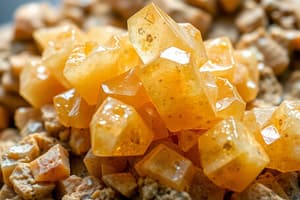Podcast
Questions and Answers
How was phosphorus first made by Hennig Brandt?
How was phosphorus first made by Hennig Brandt?
- By evaporating milk and heating the residue until red hot
- By distilling vinegar and heating the residue until red hot
- By evaporating water and heating the residue until red hot
- By evaporating urine and heating the residue until red hot (correct)
What did Hennig Brandt initially think he had discovered when he made phosphorus?
What did Hennig Brandt initially think he had discovered when he made phosphorus?
- A powerful explosive
- A precious gemstone
- A new type of metal
- The Philosopher’s Stone (correct)
Who did Hennig Brandt sell phosphorus to when he ran out of money?
Who did Hennig Brandt sell phosphorus to when he ran out of money?
- Ambrose Godfrey
- Daniel Kraft (correct)
- Antoine Lavoisier
- Robert Boyle
What did Robert Boyle do upon being fascinated by phosphorus exhibited in London?
What did Robert Boyle do upon being fascinated by phosphorus exhibited in London?
What material could be used to make phosphorus more widely available in the 1800s?
What material could be used to make phosphorus more widely available in the 1800s?
What is the major role of phosphate in living cells?
What is the major role of phosphate in living cells?
What is hypophosphatemia?
What is hypophosphatemia?
How is phosphorus absorption described in the text?
How is phosphorus absorption described in the text?
What is the normal range for serum or plasma phosphate concentration in adults?
What is the normal range for serum or plasma phosphate concentration in adults?
How do high phosphorus intakes impact serum PTH levels?
How do high phosphorus intakes impact serum PTH levels?
What happens when kidney function declines in relation to phosphate excretion?
What happens when kidney function declines in relation to phosphate excretion?
What are phospholipids primarily associated with in the body?
What are phospholipids primarily associated with in the body?
Which hormone affects phosphorus homeostasis along with vitamin D?
Which hormone affects phosphorus homeostasis along with vitamin D?
What is the main structural component in bones and tooth enamel involving phosphorus and calcium?
What is the main structural component in bones and tooth enamel involving phosphorus and calcium?
What happens when there is a combination of high phosphorus intake and low calcium intake?
What happens when there is a combination of high phosphorus intake and low calcium intake?
Flashcards are hidden until you start studying
Study Notes
Discovery of Phosphorus
- Hennig Brandt discovered phosphorus in 1669 by evaporating urine and heating the residue until it was red hot, collecting phosphorus vapor by condensing it in water.
Properties of Phosphorus
- Phosphorus is generally colorless, odorless, and nonvolatile.
Roles of Phosphorus
- Plays a major role in the structural framework of DNA and RNA.
- Living cells use phosphate to transport cellular energy in the form of adenosine triphosphate (ATP).
- Acts as a structural component of all cellular membranes.
- Calcium phosphate helps in stiffening bones.
Sources of Phosphorus
- Milk
- Meat
- Soybean products
- Eggs
- Seeds and nuts
- Fruits and vegetables
Disorders Related to Phosphorus
- Hypophosphatemia: low levels of soluble phosphate inside the cell and in blood serum, leading to neurological disorders, disruption of muscle and blood cells due to lack of ATP.
- Hyperphosphatemia: high levels of phosphate, leading to calcification, hardening of organs and soft tissues.
Phosphorus in the Human Body
- Makes up about 1% to 1.4% of fat-free mass.
- 85% of phosphorus is found in bones and teeth, and the other 15% is distributed throughout the blood and soft tissues.
Absorption and Regulation of Phosphorus
- Phosphorus undergoes passive absorption in the small intestine and active transport.
- Interrelated with calcium, as hormones like vitamin D and parathyroid hormone (PTH) regulate the metabolism of both minerals.
- Kidneys, bones, and intestines regulate phosphorus homeostasis, maintaining urinary losses equivalent to net phosphorus absorption.
Assessment of Phosphorus Status
- Normal phosphate concentration in serum or plasma: 2.5 to 4.5 mg/dL (0.81 to 1.45 mmol/L).
- Hypophosphatemia: serum phosphate concentrations lower than the low end of the normal range.
- Hyperphosphatemia: serum phosphate concentrations higher than the high end of the normal range.
Studying That Suits You
Use AI to generate personalized quizzes and flashcards to suit your learning preferences.




